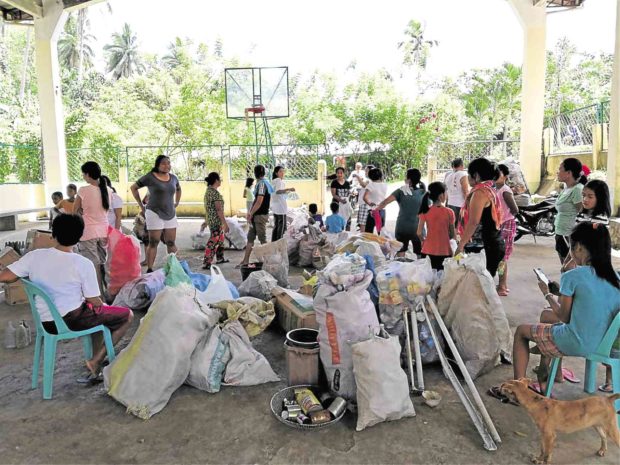New ways of reusing garbage may lead to environmental poisoning, scientist warns

TRADING TRASH In Ligao City, villagers trade their recyclable trash for grocery items. —MICHAEL JAUCIAN
BAGUIO CITY—The country is shifting to new technologies that will use trash to generate electricity but the so-called “win-win” solutions to the garbage crisis may end up poisoning the environment, a scientist warned.
Unless safe technologies are installed and environmental managers execute monitoring protocols, these solutions will inevitably produce dioxins, Dr. Jorge Emmanuel, the former consultant on health-care waste projects of the United Nations Development Program and now Silliman University professor, told participants in the State of Nature Assessment (Green Sona) conference here last week.
The World Health Organization (WHO) describes dioxins as industrial by-products that are of “huge concern for their highly toxic potential.”
Dioxins, which are also produced after volcanic eruptions or forest fires, “tend to accumulate in the food chain … [and the] higher an animal is in the food chain, the higher the concentration of dioxins,” according to WHO.
“Any of these technologies that says it will take your waste … it is going to be clean and then you will get energy from it, the first thing you have to remember is it is not making waste disappear,” Emmanuel said.
High maintenance
The Stockholm convention on persistent organic pollutants says waste-to-energy technologies must have air pollution devices to lower their dioxin emissions, he said.
At present, devices that measure dioxin in the environment are outdated, Emmanuel said, and there are few experts in the Environmental Management Bureau (EMB) who keep watch over waste-to-energy projects awarded by the Department of Energy.
He also said waste-to-energy systems are expensive and require high maintenance.
Environmental advocates at the Green Sona questioned the ability of local governments and private contractors to handle the operation and maintenance of waste-to-energy plants, citing the failure of some towns and provinces to comply with the establishment of engineered sanitary landfills and waste recovery facilities as required by the EMB.
Baguio City has launched its own waste management project that combines a waste-to-energy system and machines that convert raw organic waste into fertilizer.
Regulation
It has been spending P90 million yearly to haul garbage to a commercial landfill after the city dump collapsed and was shut down in 2011.
The city plans to put up its landfill at an abandoned open-pit mine offered by a mining company in neighboring Itogon town, Benguet province.
“We in public health have been pushing for more regulations, showing evidence that these dioxins are so problematic,” Emmanuel said, adding that solid waste is “not a technology problem but a behavioral matter.”
Waste segregation, composting and recycling are still the best ways to manage solid waste, he said, citing the success of the “zero-waste” programs of Pampanga province as well as San Francisco in California and Buenos Aires in Argentina.
Emmanuel said the country’s environmental groups need to be vigilant because waste-to-energy projects will soon be legitimized when Congress passes a measure amending the Clean Air Act of 1999 (Republic Act No. 8749) and the Ecological Solid Waste Management Act (Republic Act No. 9003).
He also said environmental groups need to voice out their concerns about House Bill No. 6893, sponsored by Nueva Ecija Rep. Estrellita Suansing, that will “allow the use of thermal and other treatment technologies to dispose of or utilize municipal and hazardous wastes for fuel.” —KIMBERLIE QUITASOL